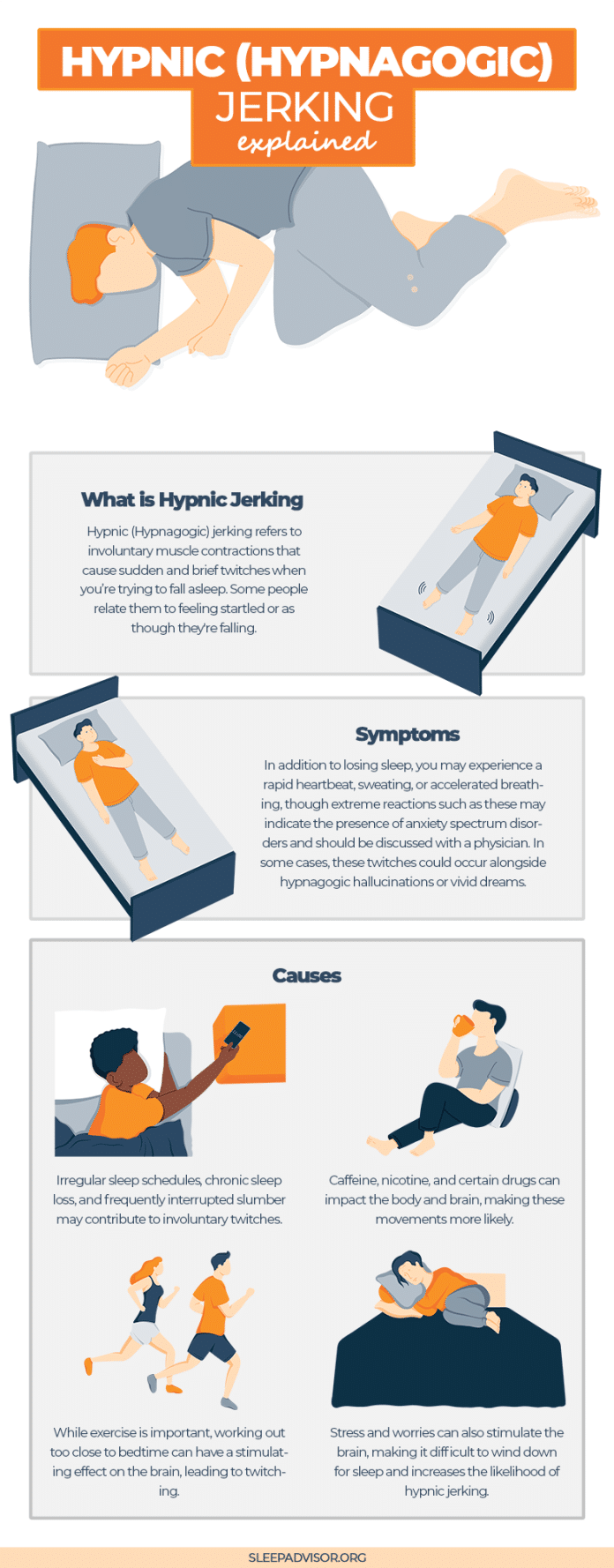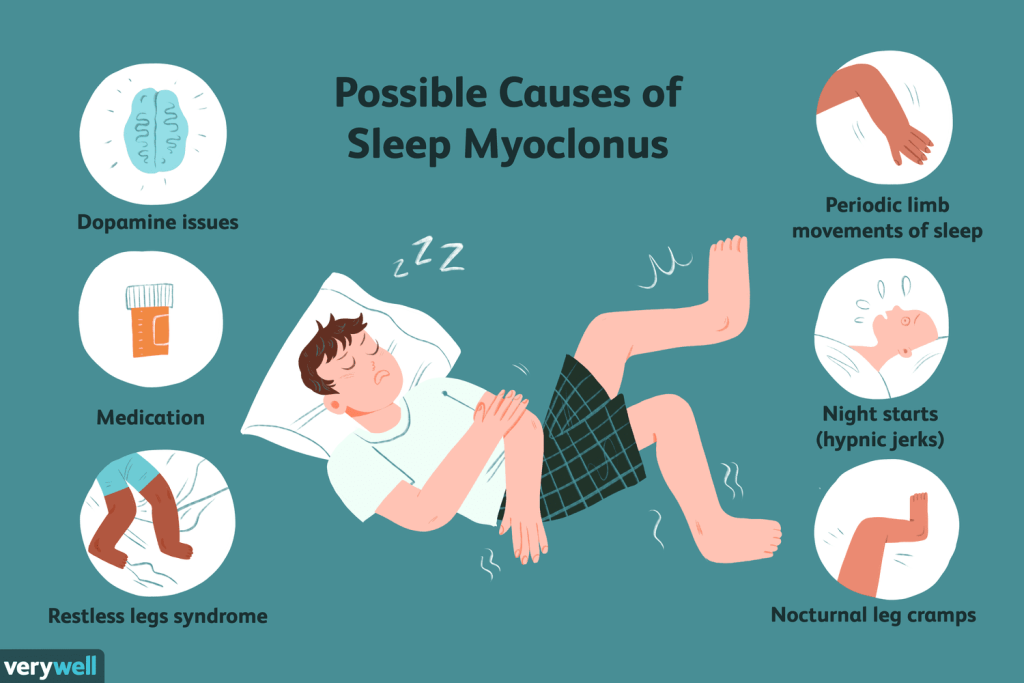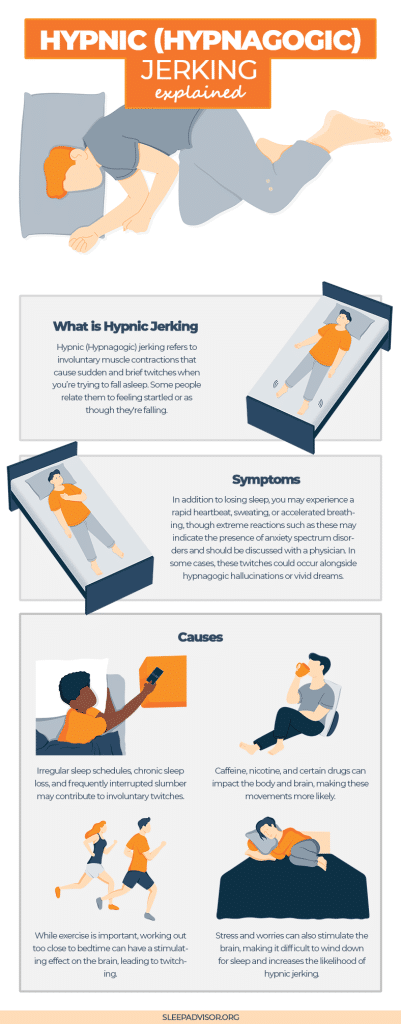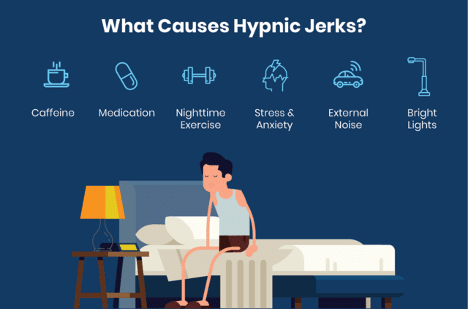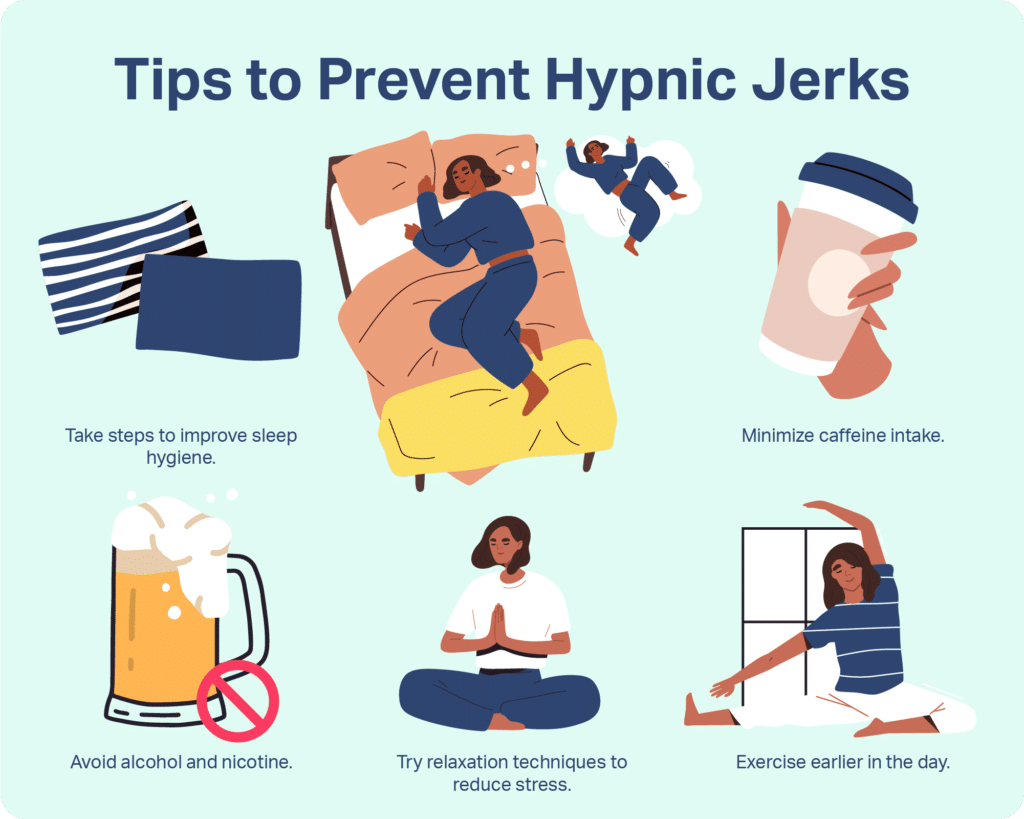Have you ever experienced that sudden twitch or jerk just as you’re about to doze off? It’s a common occurrence that many of us have experienced, but have you ever wondered what causes these muscle jerks before falling asleep? In this article, we explore the fascinating phenomenon of these involuntary movements and uncover the possible reasons behind them. So, get ready to unravel the mystery and gain a better understanding of what’s happening to our bodies as we drift off to dreamland.
This image is property of www.verywellhealth.com.
Review contents
Overview
Muscle jerks before falling asleep, also known as hypnic jerks or sleep starts, are sudden involuntary muscle movements that occur as a person is transitioning from wakefulness to sleep. These jerks often consist of a sudden, brief, and sometimes intense muscle contraction, usually affecting the limbs or the entire body. While it is normal for most people to experience muscle jerks occasionally, frequent or disruptive jerks may indicate an underlying issue that requires attention. In this article, we will explore the causes, risk factors, prevention strategies, when to see a doctor, diagnosis methods, and treatment options for muscle jerks before falling asleep.
Causes
-
Hypnic jerk reflex: The most common cause of muscle jerks before falling asleep is the hypnic jerk reflex. This reflex is believed to occur when the brain misinterprets the relaxation of muscles during the transition to sleep as a sign of falling or tripping. As a protective mechanism, the brain sends a signal to the muscles to abruptly contract, causing the jerking sensation.
-
Anxiety and stress: High levels of anxiety and stress can contribute to muscle jerks before falling asleep. These emotional states can increase muscle tension, leading to more significant and frequent jerks during sleep onset.
-
Caffeine consumption: Consuming caffeinated beverages or foods close to bedtime can interfere with sleep and contribute to muscle jerks. Caffeine is a stimulant that can increase nervous system activity, making it more likely for muscle jerks to occur during the transition to sleep.
-
Sleep deprivation: Lack of sufficient sleep can disrupt the normal sleep cycle and increase the likelihood of muscle jerks before falling asleep. Sleep deprivation can also lead to increased muscle tension, exacerbating the jerking sensations.
-
Restless leg syndrome: Restless leg syndrome (RLS) is a neurological disorder characterized by an uncomfortable sensation in the legs that often leads to an irresistible urge to move them. The restlessness and leg movements associated with RLS can cause muscle jerks before falling asleep.
-
Periodic limb movement disorder: Periodic limb movement disorder (PLMD) is a sleep disorder characterized by repetitive and involuntary movements of the limbs during sleep. These movements can range from subtle twitches to more forceful jerks, often disturbing sleep onset.
-
Sleep disorders: Certain sleep disorders, such as sleep apnea or narcolepsy, can contribute to muscle jerks before falling asleep. These disorders disrupt the normal sleep cycle and can lead to increased muscle activity during sleep transitions.
-
Alcohol or drug withdrawal: Abruptly stopping the use of alcohol or certain drugs can trigger withdrawal symptoms, including muscle jerks before falling asleep. The body’s adjustment to the absence of these substances can cause increased muscle activity during sleep onset.
-
Neurological conditions: Some neurological conditions, such as epilepsy or multiple sclerosis, can be associated with muscle jerks before falling asleep. These conditions affect the brain and nervous system, leading to abnormal muscle activity during sleep.
-
Medications: Certain medications, such as antidepressants or stimulants, may increase the likelihood of muscle jerks before falling asleep. These medications can affect the brain’s neurotransmitters and disrupt the normal regulation of muscle activity during sleep onset.
Risk Factors
-
Age: Muscle jerks before falling asleep can occur in individuals of any age, but they are more common in children and young adults. As we age, the frequency of muscle jerks tends to decrease.
-
Genetics: There may be a genetic predisposition for experiencing muscle jerks before falling asleep. Individuals with a family history of sleep starts or sleep disorders may be more susceptible to these involuntary muscle movements.
-
Lifestyle factors: Certain lifestyle factors can increase the risk of muscle jerks before falling asleep. These include excessive caffeine consumption, irregular sleep schedules, high levels of stress, and sedentary behaviors.
Prevention
Taking proactive steps to prevent muscle jerks before falling asleep can help improve sleep quality and reduce the frequency and intensity of these involuntary movements. Here are some prevention strategies:
-
Manage stress and anxiety: Engaging in stress-reducing activities, such as relaxation techniques, deep breathing exercises, or meditation, can help lower anxiety levels and promote muscle relaxation before sleep.
-
Limit stimulant intake: Avoid consuming caffeine or other stimulants close to bedtime, as they can increase muscle activity and interfere with falling asleep smoothly.
-
Create a sleep-friendly environment: Design your bedroom environment to promote relaxation and minimize distractions. Ensure that the room is dark, quiet, and at a comfortable temperature to facilitate a peaceful sleep environment.
-
Establish a bedtime routine: Establishing a consistent bedtime routine can signal to your body that it is time to relax and prepare for sleep. This routine can include activities like taking a warm bath, reading a book, or practicing gentle stretching.
-
Practice relaxation techniques: Incorporate relaxation techniques before bedtime, such as progressive muscle relaxation or guided imagery. These techniques can help release muscle tension and promote a calm state before sleep.
This image is property of www.sleepadvisor.org.
When to See a Doctor
While muscle jerks before falling asleep are usually harmless, there are certain situations where it is advisable to consult a healthcare professional:
-
Frequent or severe muscle jerks: If you experience muscle jerks on a regular basis or if they are particularly intense, it is recommended to seek medical advice. These could be indicative of an underlying medical condition that requires evaluation.
-
Disruption of sleep or daily life: If muscle jerks significantly disrupt your ability to fall asleep or stay asleep, or if they interfere with your daily activities and overall quality of life, it is important to consult with a healthcare professional for further assessment and management.
-
Presence of other concerning symptoms: If muscle jerks are accompanied by other symptoms such as pain, numbness, weakness, or changes in consciousness, it is essential to seek medical attention promptly. These additional symptoms could indicate a more serious underlying condition that requires immediate evaluation and treatment.
Diagnosis
To determine the cause and appropriate treatment for muscle jerks before falling asleep, healthcare professionals may use the following diagnostic methods:
-
Medical history and physical examination: A thorough assessment of your medical history and a physical examination can help identify any potential underlying causes or contributing factors for muscle jerks.
-
Sleep study (polysomnography): A sleep study is a comprehensive assessment that monitors brain activity, breathing patterns, oxygen levels, muscle movements, and other physiological indicators during sleep. This test can help identify underlying sleep disorders or abnormal muscle activity during sleep.
-
Blood tests: Blood tests may be conducted to check for specific markers or imbalances that could be contributing to muscle jerks. These tests can help identify potential underlying medical conditions or medication-related factors.
-
Imaging tests: In some cases, imaging tests such as magnetic resonance imaging (MRI) or computerized tomography (CT) scans may be recommended to evaluate the brain, spinal cord, or other relevant structures for abnormalities.
-
Electromyography (EMG): Electromyography is a test that measures electrical activity in muscles. It can help assess muscle activity during sleep and detect any irregular patterns or abnormal muscle movements.
This image is property of www.sleepscore.com.
Treatment
The treatment approach for muscle jerks before falling asleep depends on the underlying cause and severity of symptoms. The following treatment options may be considered:
-
Address underlying causes: Treating any underlying medical conditions, such as restless leg syndrome or sleep apnea, can help alleviate muscle jerks. This may involve lifestyle modifications, medication, or other targeted interventions.
-
Medications: In some cases, medications may be prescribed to help manage muscle jerks before falling asleep. These may include muscle relaxants, anticonvulsants, or medications that target specific underlying conditions.
-
Lifestyle changes: Making certain lifestyle modifications, such as reducing caffeine consumption, maintaining a consistent sleep schedule, and managing stress, can help reduce the frequency and intensity of muscle jerks.
-
Relaxation techniques: Engaging in relaxation techniques, such as deep breathing exercises, progressive muscle relaxation, or yoga, can help promote muscle relaxation and reduce the occurrence of muscle jerks before falling asleep.
-
Cognitive behavioral therapy (CBT): Cognitive behavioral therapy, specifically aimed at improving sleep hygiene and addressing any underlying psychological factors contributing to muscle jerks, can be beneficial in managing these symptoms.
Conclusion
Muscle jerks before falling asleep are commonly experienced by many individuals and are often harmless. However, frequent or disruptive muscle jerks may indicate an underlying issue or sleep disorder that requires attention. By addressing the underlying causes, managing stress, adopting healthy sleep practices, and seeking appropriate medical care when needed, individuals can reduce the frequency and impact of muscle jerks before falling asleep, leading to improved sleep quality and overall well-being.
This image is property of www.sleepfoundation.org.

